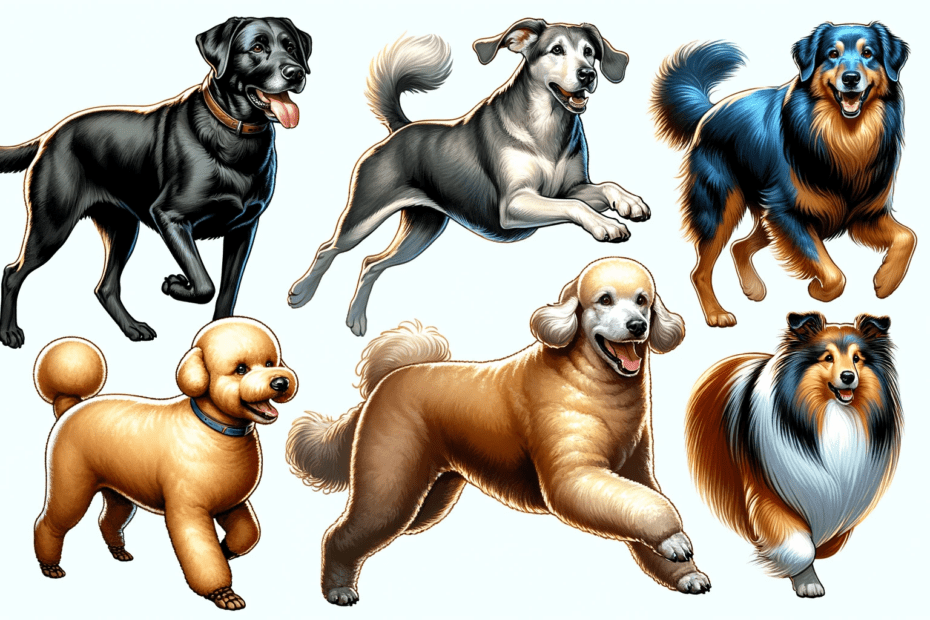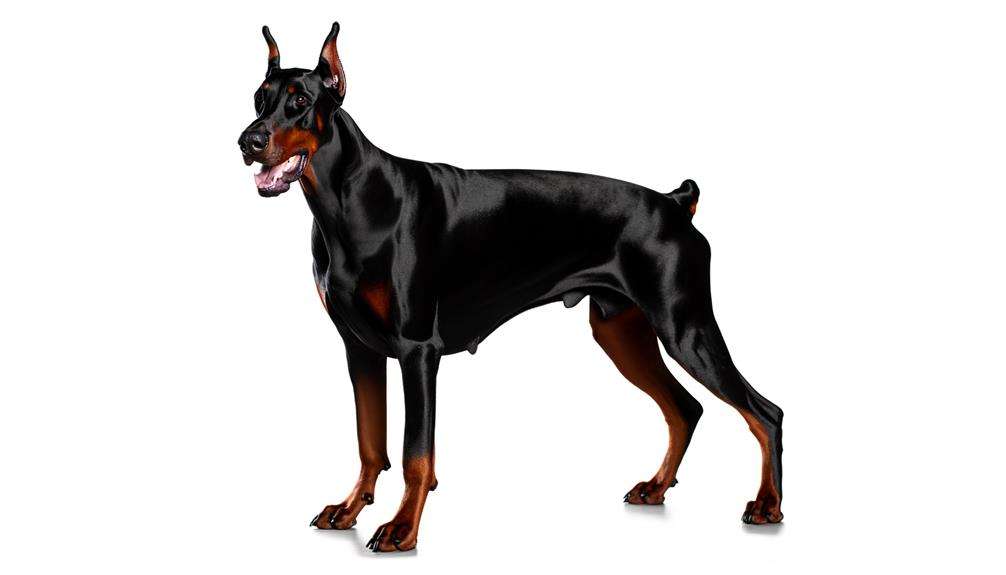Are you looking for a dog breed with a long lifespan and minimal health issues? Look no further!
In this article, we will guide you through the top dog breeds that fit this criteria.
From the friendly Labrador Retriever to the intelligent Border Collie, these breeds are known for their robust health and longevity.
So, if you're searching for a furry companion that will be by your side for years to come, keep reading to discover the perfect breed for you.
Key Takeaways
- Labrador Retrievers, Beagles, and Australian Cattle Dogs have an average lifespan of 12-15 years, and good breeding practices and genetic testing can reduce the risk of hereditary diseases.
- Regular exercise and a balanced diet are important for preventing obesity and associated health problems in these breeds.
- Regular veterinary care, check-ups, vaccinations, and preventive treatments are necessary for maintaining the health of these breeds.
- Shiba Inus have a lifespan of 12-15 years and require proper socialization and consistent training. They are affectionate and loyal towards family members but may not get along with small animals. Regular grooming and dental hygiene are also important for their overall health.
Labrador Retriever
If you're looking for a dog breed with a long lifespan and minimal health issues, the Labrador Retriever is an excellent choice. Labradors are known for their healthy aging and can live up to 12-14 years on average. However, there are several factors that can influence a Labrador's lifespan.
One of the main factors that contribute to the healthy aging of Labradors is their genetics. Good breeding practices and responsible breeding can help reduce the risk of hereditary diseases and health issues in this breed. Regular health screenings and genetic testing can also help identify any potential health concerns early on.
Another important factor is proper nutrition and exercise. Labradors are prone to obesity, which can lead to various health problems and shorten their lifespan. Feeding them a balanced diet and providing regular exercise can help maintain a healthy weight and keep them active and fit.
Regular veterinary care is also crucial for the overall health and longevity of Labradors. Routine check-ups, vaccinations, and preventive treatments for parasites can help detect and prevent any potential health issues.
Lastly, providing a safe and loving environment for your Labrador is essential for their well-being and longevity. A stress-free and stimulating environment, along with mental and physical stimulation, can contribute to their overall health and happiness.
Beagle
When considering a dog breed with a long lifespan and minimal health issues, you should look into the Beagle. Beagles are known for their friendly and energetic nature, making them a popular choice for families and individuals alike.
Here are some factors that influence the lifespan of Beagles and contribute to their healthy aging:
- Genetics: Like any other breed, the genetic makeup of a Beagle plays a crucial role in determining its lifespan. Responsible breeders can help minimize genetic health issues by selecting dogs with good overall health and longevity in their bloodlines.
- Diet and Exercise: Providing a balanced diet and regular exercise is essential for the overall well-being of a Beagle. Obesity can lead to various health issues, so it's important to monitor their weight and provide them with a nutritious diet.
- Preventive Healthcare: Regular veterinary check-ups, vaccinations, and preventive treatments for parasites are important for the long-term health of Beagles. Early detection of any health issues can lead to prompt treatment and better outcomes.
Australian Cattle Dog
To ensure a long and healthy life for your Australian Cattle Dog, regularly provide them with nutritious meals and exercise. The Australian Cattle Dog is generally a healthy breed with a lifespan of around 12 to 15 years. However, like any other dog breed, they may be prone to certain health issues.
One common health issue that Australian Cattle Dogs may face is hip dysplasia. This condition occurs when the hip joint doesn't develop properly, leading to discomfort and difficulty in movement. Regular check-ups with your veterinarian can help detect this condition early and provide appropriate treatment.
Another potential health concern for Australian Cattle Dogs is progressive retinal atrophy (PRA). PRA is a degenerative eye disease that can lead to blindness. Regular eye examinations can help identify this condition in its early stages, allowing for possible management and treatment options.
Additionally, Australian Cattle Dogs may be susceptible to deafness. It's important to regularly check your dog's hearing and seek professional advice if you suspect any hearing impairment.
To promote the overall well-being of your Australian Cattle Dog, it's crucial to maintain a balanced diet, provide regular exercise, and schedule routine visits to the veterinarian. By taking these preventive measures, you can help ensure a long and healthy life for your loyal companion.
Shiba Inu
Moving on to the Shiba Inu, like the Australian Cattle Dog, this breed is known for its long lifespan and minimal health issues. If you're considering getting a Shiba Inu as a pet, here are some key points to keep in mind:
- Temperament:
- Shiba Inus are known for their spirited and independent nature. They're intelligent and have a strong sense of self, which can sometimes make training a bit challenging. However, with proper socialization and consistent training, they can become well-behaved and loyal companions.
- While they may be reserved towards strangers, Shiba Inus are usually affectionate and loyal towards their family members. They can be quite playful and enjoy interactive activities with their owners.
- It's important to note that Shiba Inus have a strong prey drive and may not get along well with small animals, so early socialization is key to ensure they coexist peacefully with other pets.
- Grooming Requirements:
- Shiba Inus have a thick double coat that requires regular brushing to prevent matting and to keep their fur looking its best. They shed moderately throughout the year and have two heavy shedding seasons during spring and fall, during which more frequent brushing is necessary.
- Bathing should be done as needed, typically every few months, as frequent bathing can strip the natural oils from their coat and cause dryness.
- In addition to coat care, regular dental hygiene, nail trimming, and ear cleaning are essential parts of Shiba Inu grooming to maintain their overall health and hygiene.
Border Collie
When it comes to healthy aging, Border Collies are known for their remarkable longevity. They've an average lifespan of 12-15 years, which is quite impressive for a medium-sized breed.
Several factors contribute to their extended lifespan, including their genetic health advantages and their active lifestyle.
Healthy Aging in Border Collies
As a Border Collie owner, you can ensure healthy aging for your furry companion by providing regular exercise and a balanced diet. Border Collies are known for their high energy levels and intelligence, so it's important to engage them in activities that stimulate both their body and mind.
Here are some tips to help your Border Collie age gracefully:
- Feed them a healthy diet: A well-balanced diet is crucial for the overall health and longevity of your Border Collie. Ensure they receive the right amount of proteins, carbohydrates, fats, vitamins, and minerals to support their aging body.
- Maintain exercise routines: Border Collies thrive on physical activity. Regular exercise not only keeps them fit but also helps prevent obesity and related health issues. Engage in activities like daily walks, runs, or interactive play sessions that challenge their agility and problem-solving skills.
- Mental stimulation: Border Collies are highly intelligent and need mental stimulation to stay sharp. Incorporate puzzle toys, obedience training, and interactive games to keep their minds active and engaged.
Factors Influencing Lifespan
Improving your Border Collie's lifespan involves addressing various factors that can influence their overall health and longevity.
There are several key factors that can affect the lifespan of a Border Collie. Genetics plays a significant role, as certain inherited traits can increase the risk of certain health conditions that may shorten their lifespan.
Additionally, diet and exercise are essential for maintaining good health and promoting longevity. Providing a balanced diet that meets your Border Collie's nutritional needs and ensuring they get regular physical activity is crucial.
The environment in which your Border Collie lives also has an impact on their longevity. Exposure to toxins, pollutants, and other environmental hazards can negatively affect their health and potentially shorten their lifespan. Therefore, it's essential to create a safe and healthy living environment for your Border Collie to maximize their lifespan.
Genetic Health Advantages
You can benefit from the genetic health advantages of owning a Border Collie. This breed is known for its minimal health issues and long lifespan, making it an excellent choice for a pet.
Here are some reasons why Border Collies have genetic health advantages:
- Genetic Testing: Border Collies are often subjected to genetic testing to identify any potential health concerns. This allows breeders to make informed decisions when selecting breeding pairs, reducing the risk of passing on inherited diseases.
- Minimal Breed Specific Health Concerns: Compared to other breeds, Border Collies have fewer breed-specific health issues. This is due to careful breeding practices and genetic testing, which helps to eliminate or reduce the prevalence of certain health conditions.
- Strong Genetic Foundation: Border Collies have a diverse and robust genetic pool, which contributes to their overall health and resilience. This genetic diversity helps to minimize the risk of inherited diseases and promotes a longer and healthier lifespan.
Australian Shepherd
If you're looking for a dog breed with a long lifespan and minimal health issues, the Australian Shepherd is worth considering. Aussies have an average lifespan of 12 to 15 years, which is quite impressive.
They're generally a healthy breed with minimal genetic health problems, although they can still be prone to certain conditions like hip dysplasia and epilepsy.
Aussie Lifespan and Health
With their average lifespan of 12-15 years, Australian Shepherds are known for their long lives and minimal health issues. When it comes to exercise, Aussies have high energy levels and require a good amount of physical activity to keep them happy and healthy. Daily walks, runs, and playtime are essential to meet their exercise requirements. They thrive in active households and excel in agility and obedience training. However, it's important to ensure they don't overexert themselves, especially in extreme temperatures.
Despite their overall good health, Australian Shepherds are prone to certain common health issues. These include hip dysplasia, epilepsy, and eye problems such as cataracts and progressive retinal atrophy. Regular vet check-ups and a nutritious diet can help minimize the risk of these health concerns and ensure a long and fulfilling life for your Aussie companion.
Minimal Health Issues
Experiencing minimal health issues, Australian Shepherds are known for their robustness and longevity. These factors affecting longevity make them a popular choice among dog owners.
One of the main benefits of minimal health issues is that it allows Australian Shepherds to live longer, healthier lives. Unlike other breeds that are prone to various health problems, such as hip dysplasia or eye issues, Australian Shepherds have a lower risk of developing these conditions.
This not only saves dog owners from the emotional and financial burden of treating chronic illnesses but also ensures that their beloved pets can enjoy an active and fulfilling life.
The minimal health issues of Australian Shepherds contribute to their reputation as a resilient and long-lived breed, making them an excellent choice for those seeking a companion with fewer health concerns.
Dachshund
You'll find that Dachshunds boast a long lifespan and minimal health issues compared to other dog breeds. This small-sized breed typically lives between 12 to 16 years, which is quite impressive for dogs. However, it's important to note that the lifespan can vary depending on factors such as genetics, diet, exercise, and overall care.
Here are some key points about Dachshund lifespan and health concerns:
- Dachshunds are generally healthy dogs, but they're prone to certain health issues, including:
- Intervertebral Disc Disease (IVDD): This condition affects the spinal discs and can lead to back pain or even paralysis. It's more common in Dachshunds due to their long bodies and short legs.
- Obesity: Dachshunds have a tendency to gain weight easily, which can put strain on their joints and lead to various health problems.
- Dental issues: Their long jaws and crowded teeth make Dachshunds more susceptible to dental problems such as gum disease and tooth decay.
Frequently Asked Questions
Are There Any Specific Health Issues That Labrador Retrievers Are Prone To?
Labrador retrievers, like any breed, have their own set of health issues. While they are generally healthy dogs, they are prone to common ailments such as hip and elbow dysplasia, obesity, and certain eye conditions.
How Much Exercise Does a Beagle Typically Need to Stay Healthy?
To keep your Beagle healthy, it's important to provide regular exercise. Beagles have high energy levels and require daily walks or playtime. Unlike Labrador Retrievers, they are not prone to specific health issues.
Are Australian Cattle Dogs Good With Children?
Australian cattle dogs are generally good with children, but it's important to socialize them early and provide proper training. While they have a herding instinct, aggression can be managed with proper care and attention.
Do Shiba Inus Require a Lot of Grooming?
Shiba Inus have moderate grooming needs and are known for their shedding tendencies. Regular brushing and occasional bathing should suffice to keep their coat clean and healthy.
What Is the Average Lifespan of a Border Collie?
The average lifespan of a Border Collie is around 10 to 14 years. They are highly intelligent dogs known for their exceptional training abilities and agility.
Conclusion
In conclusion, when it comes to selecting a dog breed with a long lifespan and minimal health issues, Labrador Retrievers, Beagles, Australian Cattle Dogs, Shiba Inus, Border Collies, Australian Shepherds, and Dachshunds are all excellent choices.
These breeds tend to have fewer health problems and can live relatively long lives, providing you with years of companionship and joy.
Remember to always consult with a veterinarian to ensure your dog's health and well-being throughout their lifespan.






